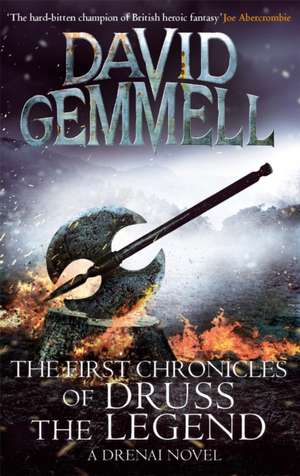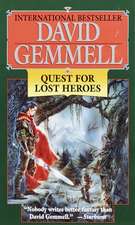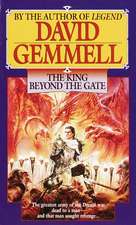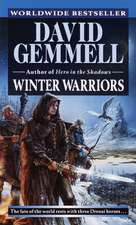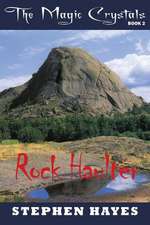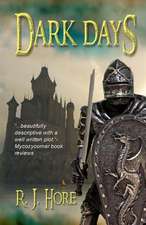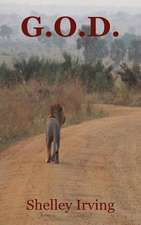The First Chronicles Of Druss The Legend: Drenai
Autor David Gemmellen Limba Engleză Paperback – 7 iun 2012
Armed with only his powerful double-bladed ax, Snaga, Druss went after Rowena. His journey would carry him from the highest thrones of power to the deepest dungeons of depravity. Along the way, he would battle savage monsters and descend into terrifying lands of black magic and demons.
Yet one thing was certain. Druss would have victory . . . or death.
| Toate formatele și edițiile | Preț | Express |
|---|---|---|
| Paperback (2) | 48.25 lei 3-5 săpt. | |
| Del Rey Books – 30 sep 1999 | 48.25 lei 3-5 săpt. | |
| Little Brown Book Group – 7 iun 2012 | 49.36 lei 3-5 săpt. | +25.83 lei 4-10 zile |
Preț: 49.36 lei
Preț vechi: 64.07 lei
-23% Nou
Puncte Express: 74
Preț estimativ în valută:
9.45€ • 9.83$ • 7.80£
9.45€ • 9.83$ • 7.80£
Carte disponibilă
Livrare economică 24 martie-07 aprilie
Livrare express 07-13 martie pentru 35.82 lei
Preluare comenzi: 021 569.72.76
Specificații
ISBN-13: 9780356501420
ISBN-10: 0356501426
Pagini: 384
Dimensiuni: 132 x 196 x 25 mm
Greutate: 0.27 kg
Editura: Little Brown Book Group
Seria Drenai
ISBN-10: 0356501426
Pagini: 384
Dimensiuni: 132 x 196 x 25 mm
Greutate: 0.27 kg
Editura: Little Brown Book Group
Seria Drenai
Recenzii
Gemmell's great reading - the action never lets up. He's several rungs above the good rigt into the fabulous! Anne McCaffrey Has pace, conviction and gritty resolute vitality...The result is a book that will be enjoyed by Tolkien fans TIMES EDUCATIONAL SUPPLEMENT David Gemmell manages to take a familiar, generic scenario and infuse it with meaning...it's a thoughtful genre fantasy, a bit chewier than most, and quite, quite tasty LOCUS
Notă biografică
David Gemmell was born in London, England, in the summer of 1948. Expelled from school at sixteen for organizing a gambling syndicate, he became a laborer by day, and at night his six-foot-four-inch, 230-pound frame allowed him to earn extra money as a bouncer working nightclubs in Soho.
Born with a silver tongue, Gemmell rarely needed to bounce customers, relying on his gift of gab to talk his way out of trouble. At eighteen this talent led to a job as a trainee journalist, and he eventually worked as a freelancer for the London Daily Mail, Daily Mirror, and Daily Express. His first novel, Legend, was published in 1984 and has remained in print ever since. He became a full-time writer in 1986.
Born with a silver tongue, Gemmell rarely needed to bounce customers, relying on his gift of gab to talk his way out of trouble. At eighteen this talent led to a job as a trainee journalist, and he eventually worked as a freelancer for the London Daily Mail, Daily Mirror, and Daily Express. His first novel, Legend, was published in 1984 and has remained in print ever since. He became a full-time writer in 1986.
Extras
Screened by the undergrowth, he knelt by the trail, dark eyes scanning the boulders ahead of him and the trees beyond. Dressed as he was in a shirt of fringed buckskin, and brown leather leggings and boots, the tall man was virtually invisible, kneeling in the shadows of the trees.
The sun was high in a cloudless summer sky, and the spoor was more than three hours old. Insects had crisscrossed the hoofmarks, but the edges of the prints were still firm.
Forty horsemen, laden with plunder ...
Shadak faded back through the undergrowth to where his horse was tethered. He stroked the beast's long neck and lifted his swordbelt from the back of the saddle. Strapping it to his waist, he drew the two short swords; they were of the finest Vagrian steel and double edged. He thought for a moment, then sheathed the blades and reached for the bow and quiver strapped to the saddle pommel. The bow was of Vagrian horn, a hunting weapon capable of launching a two-foot-long arrow across a killing space of sixty paces. The doeskin quiver held twenty shafts that Shadak had crafted himself: the flights of goose feather, stained red and yellow, the heads of pointed iron, not barbed, and easily withdrawn from the bodies of the slain. Swiftly he strung the bow and notched an arrow to the string. Then looping the quiver over his shoulder, he made his way carefully back to the trail.
Would they have left a rearguard? It was unlikely, for there were no Drenai soldiers within fifty miles.
But Shadak was a cautious man. And he knew Collan. Tension rose in him as he pictured the smiling face and the cruel, mocking eyes. "No anger," he told himself. But it was hard, bitterly hard. Angry men make mistakes, he reminded himself. The hunter must be cold as iron.
Silently he edged his way forward. A towering boulder jutted from the earth some twenty paces ahead and to his left; to the right was a cluster of smaller rocks, no more than four feet high. Shadak took a deep breath and rose from his hiding place.
From behind the large boulder a man stepped into sight, bowstring bent. Shadak dropped to his knee, the attacker's arrow slashing through the air above his head. The bowman tried to leap back behind the shelter of the boulder, but even as he was dropping, Shadak loosed a shaft which plunged into the bowman's throat, punching through the skin at the back of his neck.
Another attacker ran forward, this time from Shadak's right. With no time to notch a second arrow, Shadak swung the bow, lashing it across the man's face. As the attacker stumbled, Shadak dropped the bow and drew his two short swords; with one sweeping blow he cut through the neck of the fallen man. Two more attackers ran into view and he leapt to meet them. Both men wore iron breastplates, their necks and heads protected by chain mail, and they carried sabers.
"You'll not die easily, you bastard!" shouted the first, a tall, wide-shouldered warrior. Then his eyes narrowed as he recognized the swordsman facing him. Fear replaced battle lust--but he was too close to Shadak to withdraw and made a clumsy lunge with his saber. Shadak parried the blade with ease, his second sword lancing forward into the man's mouth and through the bones of his neck. As the swordsman died, the second warrior backed away.
"We didn't know it was you, I swear!" he said, hands trembling.
"Now you do," said Shadak softly.
Without a word the man turned and ran back toward the trees as Shadak sheathed his swords and moved to his bow. Notching an arrow, he drew back on the string. The shaft flashed through the air to punch home into the running man's thigh. He screamed and fell. As Shadak loped to where he lay, the man rolled to his back, dropping his sword.
"For pity's sake don't kill me!" he pleaded.
"You had no pity back in Corialis," said Shadak. "But tell me where Collan is heading and I'll let you live." A wolf howled in the distance, a lonely sound. It was answered by another, then another.
"There's a village ... twenty miles southeast," said the man, his eyes fixed on the short sword in Shadak's hand. "We scouted it. Plenty of young women. Collan and Harib Ka plan to raid it for slaves, then take them to Mashrapur."
Shadak nodded. "I believe you," he said at last.
"You're going to let me live, yes? You promised," the wounded man whimpered.
"I always keep my promises," said Shadak, disgusted at the man's weakness. Reaching down, he wrenched his shaft clear of the man's leg. Blood gushed from the wound, and the injured warrior groaned. Shadak wiped the arrow clean on the man's cloak, then stood and walked to the body of the first man he had killed. Kneeling beside the corpse, he recovered his arrow and then strode to where the raiders had tethered their horses. Mounting the first, he led the others back down the trail to where his gelding waited. Gathering the reins, he led the four mounts back out onto the trail.
"What about me?" shouted the wounded man.
Shadak turned in the saddle. "Do your best to keep the wolves away," he advised. "By dark they will have picked up the scent of blood."
"Leave me a horse! In the name of Mercy!"
"I am not a merciful man," said Shadak.
And he rode on toward the southeast, and the distant mountains.
The sun was high in a cloudless summer sky, and the spoor was more than three hours old. Insects had crisscrossed the hoofmarks, but the edges of the prints were still firm.
Forty horsemen, laden with plunder ...
Shadak faded back through the undergrowth to where his horse was tethered. He stroked the beast's long neck and lifted his swordbelt from the back of the saddle. Strapping it to his waist, he drew the two short swords; they were of the finest Vagrian steel and double edged. He thought for a moment, then sheathed the blades and reached for the bow and quiver strapped to the saddle pommel. The bow was of Vagrian horn, a hunting weapon capable of launching a two-foot-long arrow across a killing space of sixty paces. The doeskin quiver held twenty shafts that Shadak had crafted himself: the flights of goose feather, stained red and yellow, the heads of pointed iron, not barbed, and easily withdrawn from the bodies of the slain. Swiftly he strung the bow and notched an arrow to the string. Then looping the quiver over his shoulder, he made his way carefully back to the trail.
Would they have left a rearguard? It was unlikely, for there were no Drenai soldiers within fifty miles.
But Shadak was a cautious man. And he knew Collan. Tension rose in him as he pictured the smiling face and the cruel, mocking eyes. "No anger," he told himself. But it was hard, bitterly hard. Angry men make mistakes, he reminded himself. The hunter must be cold as iron.
Silently he edged his way forward. A towering boulder jutted from the earth some twenty paces ahead and to his left; to the right was a cluster of smaller rocks, no more than four feet high. Shadak took a deep breath and rose from his hiding place.
From behind the large boulder a man stepped into sight, bowstring bent. Shadak dropped to his knee, the attacker's arrow slashing through the air above his head. The bowman tried to leap back behind the shelter of the boulder, but even as he was dropping, Shadak loosed a shaft which plunged into the bowman's throat, punching through the skin at the back of his neck.
Another attacker ran forward, this time from Shadak's right. With no time to notch a second arrow, Shadak swung the bow, lashing it across the man's face. As the attacker stumbled, Shadak dropped the bow and drew his two short swords; with one sweeping blow he cut through the neck of the fallen man. Two more attackers ran into view and he leapt to meet them. Both men wore iron breastplates, their necks and heads protected by chain mail, and they carried sabers.
"You'll not die easily, you bastard!" shouted the first, a tall, wide-shouldered warrior. Then his eyes narrowed as he recognized the swordsman facing him. Fear replaced battle lust--but he was too close to Shadak to withdraw and made a clumsy lunge with his saber. Shadak parried the blade with ease, his second sword lancing forward into the man's mouth and through the bones of his neck. As the swordsman died, the second warrior backed away.
"We didn't know it was you, I swear!" he said, hands trembling.
"Now you do," said Shadak softly.
Without a word the man turned and ran back toward the trees as Shadak sheathed his swords and moved to his bow. Notching an arrow, he drew back on the string. The shaft flashed through the air to punch home into the running man's thigh. He screamed and fell. As Shadak loped to where he lay, the man rolled to his back, dropping his sword.
"For pity's sake don't kill me!" he pleaded.
"You had no pity back in Corialis," said Shadak. "But tell me where Collan is heading and I'll let you live." A wolf howled in the distance, a lonely sound. It was answered by another, then another.
"There's a village ... twenty miles southeast," said the man, his eyes fixed on the short sword in Shadak's hand. "We scouted it. Plenty of young women. Collan and Harib Ka plan to raid it for slaves, then take them to Mashrapur."
Shadak nodded. "I believe you," he said at last.
"You're going to let me live, yes? You promised," the wounded man whimpered.
"I always keep my promises," said Shadak, disgusted at the man's weakness. Reaching down, he wrenched his shaft clear of the man's leg. Blood gushed from the wound, and the injured warrior groaned. Shadak wiped the arrow clean on the man's cloak, then stood and walked to the body of the first man he had killed. Kneeling beside the corpse, he recovered his arrow and then strode to where the raiders had tethered their horses. Mounting the first, he led the others back down the trail to where his gelding waited. Gathering the reins, he led the four mounts back out onto the trail.
"What about me?" shouted the wounded man.
Shadak turned in the saddle. "Do your best to keep the wolves away," he advised. "By dark they will have picked up the scent of blood."
"Leave me a horse! In the name of Mercy!"
"I am not a merciful man," said Shadak.
And he rode on toward the southeast, and the distant mountains.
Textul de pe ultima copertă
He was known as Druss. The Deathwalker. Though the blood of merciless butchers coursed through his veins, he had found a fragile peace through his love for beautiful, mystical Rowena. Then came the day when Druss returned to their village and found everyone dead -- massacred by slavers who had stolen the women to sell for gold. Rowena was among the missing.
Armed with only his powerful double-bladed ax, Snaga, Druss went after Rowena. His journey would carry him from the highest thrones of power to the deepest dungeons of depravity. Along the way, he would battle savage monsters and descend into terrifying lands of black magic and demons.
Yet one things was certain. Druss would have victory ... or death.
Descriere
Descriere de la o altă ediție sau format:
Armed only with his family's deadly heirloom, a powerful double-bladed axe called Snaga, Druss journeys through strange kingdoms to rescue his wife, battling savage monsters and descending into terrifying lands of black magic and demons.
Armed only with his family's deadly heirloom, a powerful double-bladed axe called Snaga, Druss journeys through strange kingdoms to rescue his wife, battling savage monsters and descending into terrifying lands of black magic and demons.
